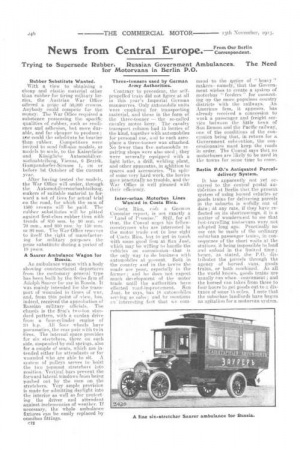From Our
Page 14

If you've noticed an error in this article please click here to report it so we can fix it.
News from Central Europe.— Berlin Correspondent.
Rubber Substitute Wanted.
'With a view to obtaining a cheap and elastic material other than rubber for tiring military lorries, the Austrian War Office offered a prize of 50,000 crowns. Anybody could compete for the money. The War Office required a substance possessing the specific qualities of rubber, such as resilience and adhesion, but more durable, and far cheaper to produce ; nr_ir could the substitute be heavier than rubber. Competitors were invited to send full-size models, or models to scale, to the Kaiserliche K und iglich e A utomobilversuchsabteilung, Vienna, 6 Bezirk, Gumpendorfer-Strasse 1, on or before 1st October of • the current year.
After having tested the models, the War Office will order, through the Automobilversuchsabteilung, makers of suitable material to forward a set of tires for actual trial on the road, for which the sum. of 1500 crowns will be paisi_ The rubber substitutes will be pitted against first-class rubber tires with treads of 870 mm. by 90 mm. or 70 mm., and 950 rum. by 150 mm. or 90 mm. The War Office reserves to itself the right of manufacturing for military purposes the prize substitute during a period of 10 years.
A Saurer Ambulance Wagon for Russia.
An ambulance wagon with a body showing constructional departures from the customary general type has been built by the Swiss firm of Adolph &rover for use in Russia. It was mainly intended for the transport of wounded in times of war, and, from this point of view, has. indeed, received the approbation of Russian military officials. The chassis is the firm's two-ton standard pattern, with a cardan drive from a four-cylinder engine of 30 h.p. All four wheels have pneumatics, the rear pair with twin tires. The internal space provides for six stretchers, three on each side, suspended by coil springs, also for a couple of seats, which are intended either for attendants or for wounded who are able to sit. A system of pulleys serves to hoist the two topmost stretchers into position. Vertical bars prevent the forward lateral windows from being pushed out by the men on the stretchers. Very ample provision is made for admitting daylight into the interior as well as for protecting the driver and attendant against inclemeneies of weather. If necessary, the whole ambulance Extures can be easily replaced by omnibus fittings.
c12 Three.tonners used by German Army Authorities.
Contrary to precedent, the selfpropelled train did not figure at all in this year's Imperial German manoeuvres. Only automobile units were employed for transporting material, and these in the form of the three-tonner — the so-called cavalry motor lorry. The cavalry transport column had 15 lorries of the kind, together with automobiles for personal use, and to each aeroplane a three-tonner was attached. No fewer than five automobile repairing shops were also used ; they were severally equipped with a light lathe, a drill, welding plant, and other apparatus, in %Within to spares and accessories. In spite of some very hard work, the lorries gave practically no trouble, and the War Office is well pleased with their efficiency.
Inter-urban Motorbus Lines Wanied in Costa Rica.
Costa Rica, vide a German Consular repot t, is not exactly a " Land of Promise." Still, for all that, the Consul urges his fellowcountrymen who are interested in the motor trade not to lose sight of Costa Rica, but to get in touch with some good firm at San Jose, which may be willing to handle the vehicles on commission—that is the only way to do business with automobiles at present. Both in the country and in the towns the roads are poor, especially in the former ; and he does not expect much development of the motor trade until the authorities have effected road-improvement. San Jose, he says, has 18 automobiles serving as cabs ; and he mentions an interesting fact that we corn
mend to the notice of "heavy " makers—namely, that the Government wishes to create a system of motorbus " feeders " for connecting up the more populous country districts with the railways. An American .firm, it appears, has already received a concession to work a passenger and freight service between the little town of San Remon and the Pacific railway, one of the conditions of the concession being that, in return for a Government subvention, the eoncessionnaire must keep the roads in order. The Consul says that no motorbuses are likely to be used in. the towns for some time to come.
Berlin P.O.'. Antiquated Parcel. delivery System.
It has apparently not yet occurred to the central postal authorities at Berlin that the present system of using horsed vehicles or goods trains for delivering parcels in the suburbs is wofully out of date ; at any rate, if they have reflected on its shortcomings, it is a matter of wonderment to me that fast-travelling inotorvans were not adopted long ago. Practically no use can be made of the ordinary suburban passenger trains, in consequence of the short waits at the stations, it being impossible to load and unload in the limited time ; hence, as stated, the P.O. distributes the parcels through the agency of horsed vans, goods trains, or both combined. As all the world knows, goods trains are usually run when—convenient ; and the horsed van takes" from three to four hours to get goods out to a distance of some 15 miles. I note that the suburban landlords have begun an agitation for a rnotorvan system.
























